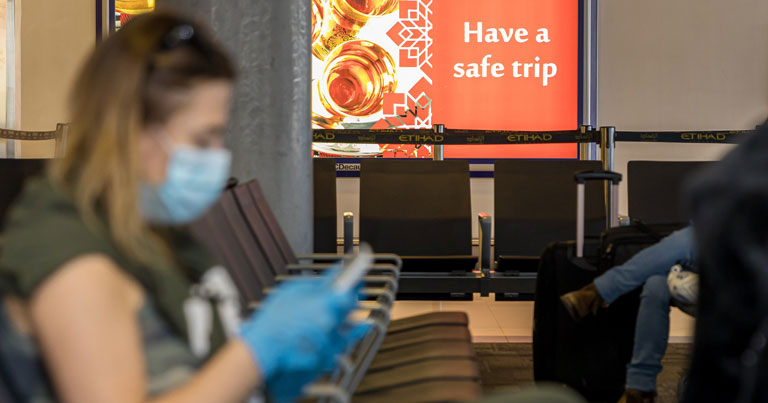
Abu Dhabi Airports is supporting global efforts to combat the COVID-19 pandemic by implementing comprehensive health and safety measures for passengers and staff as well as ensuring the safe, secure and efficient transport of essential supplies and equipment through Abu Dhabi International Airport.
Shareef Al Hashmi, Chief Executive Officer of Abu Dhabi Airports, said: “This is a critical time for the aviation sector and our nation as we come together to combat the global COVID-19 pandemic. We are committed to ensuring the health and safety of our employees, stakeholders and passengers as we continue to operate our airports and facilities in order to provide our communities and healthcare centres with the goods and equipment they need.”
A robust set of precautionary measures have been implemented at the airport, including thermal screening at passenger and staff entrances, free COVID-19 Polymerase Chain Reaction (PCR) testing for passengers and employees, workforce cluster management and regular risk assessments in coordination with Etihad Airways medical teams, enforcement of social distancing guidelines and roster realignment to ensure ample staffing at all times, in addition to the frequent sterilisation of workspaces and common areas throughout Abu Dhabi International Airport’s facilities.
Moreover, cargo operations at the airport are ongoing 24 hours a day, 7 days a week, facilitating the supply of vital equipment and goods to communities and healthcare facilities across the UAE and the world. In March, the airport processed 7,315 cargo flights and 51,885,686 million kilograms of cargo, handling on average more than 1,800 flights and 13 million kilograms of cargo per week.
The airport says that over the past month, it has experienced heavy import cargo volumes, mainly made up of commodities like facemasks and medical supplies, in addition to traditional airfreight items and an increase in perishable traffic, especially meat.
Following the suspension of all commercial passenger flights to and from the UAE on 26 March 2020, Abu Dhabi International Airport has facilitated a number of repatriation and humanitarian flights for Emiratis returning to the UAE as well as expatriates and foreign nationals departing for their countries of origin.
Etihad Airways has been operating special flights from Abu Dhabi to London, Zurich, Brussels, Tokyo, Dublin, Amsterdam, Melbourne, Seoul, Singapore, Manila and Jakarta. In addition to enabling passengers reach their desired destinations, the flights are utilising their belly-hold capacity to transport critical cargo.
Abu Dhabi Airports is coordinating and collaborating with all relevant authorities including the Abu Dhabi Government, General Civil Aviation Authority, Department of Health, and Ministry of Health and Prevention to ensure every available precautionary measure is being taken to protect the health, safety and wellbeing of its employees, stakeholders and passengers.
The circumstances surrounding COVID-19 are continuously evolving. Our friends at APEX have a dedicated COVID-19 page, which they’ll be updating regularly to help keep you up-to-date on how the novel coronavirus is impacting the aviation industry. Visit the page for the very latest news >>






